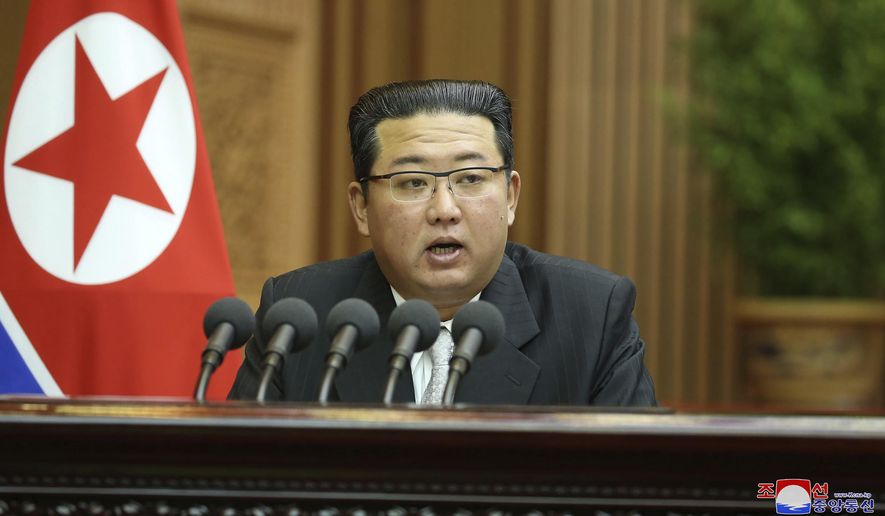North Korean leader Kim Jong-un has lashed out at the Biden administration this week, claiming its repeated offers of direct diplomatic talks are merely part of a deceptive plot designed to distract from America’s ongoing “hostile policy” toward Pyongyang.
While the North Korean leader says he’s willing to restore communication with U.S. ally South Korea, he expressed outward frustration at the “new administration” in Washington during a key policy speech on Wednesday to his regime’s rubber-stamp legislature.
As recently as this month, the State Department’s point man on the North Korean nuclear crisis Sung Kim said on an Asian tour that the U.S. had made “multiple offers” to meet with the Kim regime “without preconditions” and hoped the regime would “respond positively.”
Mr. Kim dismissed the offers outright on Wednesday. “The U.S. is touting ‘diplomatic engagement’ and ‘dialogue without preconditions,’ but it is no more than a petty trick for deceiving the international community and hiding its hostile acts and an extension of the hostile policy pursued by the successive U.S. administrations,” he said, according to state media reports.
There was no immediate reaction from the Biden administration, but Secretary of State Antony Blinken did express concern Thursday about recent North Korean missile tests, including what the Kim regime claims was the successful test launch on Tuesday of a new, nuclear-capable hypersonic missile called an Hwasong-8.
“We’re evaluating and assessing … to understand exactly what they did, what technology they used,” Mr. Blinken told reporters on a trip to Pittsburgh. “Regardless, we’ve seen repeated violations now of U.N. Security Council resolutions that the international community needs to take seriously.”
He added that the Biden administration supports the idea of a resumption of talks between North and South Korea. “We leave that to our South Korean allies as they look to see if there are ways to move forward,” Mr. Blinken said.
South Korean President Moon Jae-in has been pushing an engagement policy toward North Korea before leaving office next May. During a speech to the U.N. last week, Mr. Moon proposed that North and South Korean officials come together to sign a symbolic peace declaration, but the Kim regime appears unlikely to embrace the proposal.
Mr. Kim’s influential sister Kim Yo-jong said Friday that the regime may be open to talks with Seoul, but dismissed the notion of a peace declaration.
“Smiling a forced smile, reading the declaration of the termination of the war, and having photos taken could be essential for somebody, but I think that they would hold no water and would change nothing,” she said in a statement carried by state media.
In his remarks Wednesday, Mr. Kim suggested cross-border North-South hotlines — dormant for more than a year — could be restored in early October. However, he also lashed out at South Korea, accusing it of being “bent on begging external support and cooperation while clamoring for international cooperation in servitude to the U.S.,” rather than committed to resolving the matters independently directly with Pyongyang.
U.S.-North Korean direct talks have been stalled for more than two years following a pair of high-stakes leader-level summits between Mr. Kim and former President Donald Trump. The summits captured world attention, but ultimately failed to convince North Korea to abandon the nuclear weapons program it has clandestinely built in violation of decades of U.N. Security Council resolutions.
Since coming to office nine months ago, President Biden has kept U.S. sanctions in place against North Korea and gone ahead with joint U.S.-South Korea military drills that have triggered outrage in Pyongyang, which has responded with a series of provocative missile test launches.
There were reports Thursday that the U.N. Security Council had held an emergency closed meeting at the request of the United States, the U.K. and France to discuss North Korea’s recent tests.
North Korea has long had a policy of trying to drive a wedge between Seoul and Washington, and Mr. Kim appeared to be employing the same playbook in his most recent address, in part in hopes that South Korea can help him win relief from crippling U.S.-led economic sanctions.
The Biden administration‘s handling of North Korea policy has drawn criticism from Trump-era secretary of state, Mike Pompeo, who says the White House’s lack of a coherent response jeopardizes American credibility with allies who want “leadership from the United States.”
“I’m concerned that the United States is returning to an Obama-era policy of ‘Strategic Patience 2.0,’” Mr. Pompeo told an audience of dignitaries from South Korea and Japan at a virtual gathering hosted earlier this month by The Washington Times Foundation and the Universal Peace Federation.
Mr. Pompeo referred to years of passive diplomacy by the Bush and Obama administrations before an escalation of sanctions and other pressure on Pyongyang led to historic summits between Mr. Trump and Mr. Kim.
“If the Biden administration continues dithering, it will only give the regime more time to undermine sanctions,” Mr. Pompeo said.
• Guy Taylor can be reached at gtaylor@washingtontimes.com.




Please read our comment policy before commenting.